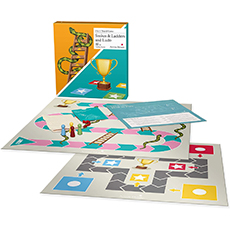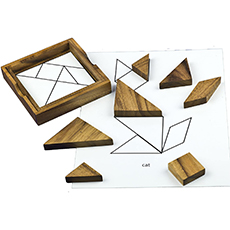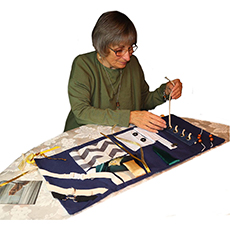Activities for people with dementia
Fun games, free activities and memory care projects for seniors

If you have a loved one with dementia, it can be difficult to spend time with them the way you used to. However, it is possible to find new activities and hobbies. Some studies suggest brain games and puzzles can slow cognitive decline and improve certain functions related to memory and independence. According to Seniorlink, some general guidelines for planning effective activities for seniors with dementia include:
- Establish consistent routines
- Be mindful of their needs
- Keep activities simple and brief
Activities for dementia patients
Below, we’ve curated a list of free and low-cost activities you can plan for dementia patients. There’s plenty of fun things you can do with everyday household items you might already have. However, some of these activities may require small purchases (yarn, for example). Remember that older adults with Alzheimer’s disease or dementia require supervision. It’s not safe to incorporate sharp objects into activities or games.
- Help with chores: Depending on what you have to do, you can involve them in simple tasks related to cooking, cleaning and gardening. Something easy like folding towels is safe and will help them feel like they are contributing. Remember that it doesn’t matter if you have to refold them.
- Ask questions: Asking an open-ended question about their life is a great way to communicate with a memory-impaired senior. Just don’t ask specific details — for example, “Can you tell me about your son?” is better than “What is your son’s name?” Alternatively, ask a straightforward question that has no wrong answer, such as, “Would you like some tea?”
- Tell a joke: People with memory problems can still have a sense of humor! A good laugh will probably be good for everyone. Humor helps with stress, which can decrease blood pressure and improve cardiovascular health. When you tell the joke, try to speak in short phrases and use words they are familiar with. According to the Journal of Alzheimer's Disease, dementia impairs the ability to decode social and emotional signals and is associated with an impaired understanding of cartoons and sarcasm.
- Hold hands: Don’t underestimate the impact of a physical connection. “Since touching the hands is so familiar, hand massage may be gladly accepted by elders living with dementia,” states Ann Catlin on Massage Today. “Even five-minutes of hand massage have been shown to elicit a physiological relaxation response and decrease cortisol levels.”
- Go for a walk: Going for a short walk every now and then is good for a change of scenery and a little fresh air.
- Untie knots: Untangling a simple knot from a medium-thick rope might be a relaxing activity for your older companion. It might sound simple, but the process of untying a knot is a little bit like a puzzle.
- Make a macaroni necklace: Just like when you were a kid — except it doesn’t have to be macaroni. We suggest trying rigatoni or penne, which might be easier since they have wider openings. Your older adult can thread string or yarn as long as they want.
- Sort fabrics: Collect assorted fabrics from around the house and put them in a box. They can touch and fold the different pieces. Ask them to sort the fabrics by color or size.
- Community engagement: Whether it’s a church or a social club, adding some elements of regular social interactions helps keep an older adult with memory problems engaged. Bingo is popular with dementia patients because there isn’t much strategy — play at home or check for regular games in your area.
Memory care activities
According to the Alzheimer’s Association, dementia is a general term used to describe symptoms like memory loss, personality change, disorientation and impaired judgment. Alzheimer's disease, the most common form of dementia, is a progressive neurological disease. It can strike at different ages, but most victims are 65 or older. Current drugs can ease symptoms but can’t reverse the course of the disease.
For people with Alzheimer's and other forms of dementia, the structure of a game paired with a daily routine can sometimes help calm aggression and anxiety. From enhancing hand-eye coordination to improving recall, there are many games patients can play in order to improve their brain health and help them have fun for as long as possible.
Make a memory box
Making a memory box can help a person with dementia remember important people and events from their past. Any kind of box will work — an old shoebox or something a little larger. You can put items that remind them of a job or hobby that they used to enjoy. For example, if they were an artist, you can include a palette of paint, brushes and paper. Consider also adding magazines related to the industry they were in before retirement.
Improvise a scene
Improv can help stir old memories and emphasize the imagination. Try roleplaying a scenario from something they used to do. For example, if your loved one was once a contractor, make the scene about what they would do for different home improvement projects.
Improv activities encourage you to stay in the moment, which can be a safe place for people who have dementia, according to Mary O'Hara in the NPR article “Improv For Alzheimer's: A Sense Of Accomplishment.”
Music therapy
Listening to music that was popular during your older adult’s youth can help stir up old memories and get them living in the moment.
We’ve heard that rock-and-roll can soothe the soul, but one study found that music therapy can be used to treat a range of neurological conditions. Another study by the University of Miami School of Medicine found that music therapy helped Alzheimer’s patients produce more melatonin, serotonin and prolactin.
Memory game exercises
Memory games can be a great way to improve cognitive function. Some brain-training computer games and apps also analyze the time it takes to answer a question to provide insight into the player's progress or deterioration.
If you use flashcards, make sure they’re not too difficult to read. Choosing large-print versions can be helpful. We suggest looking into image association games or match-the-shape games. You could also consider an all-fabric memory game ($29.90 on Amazon at the time of publication).
Fun games for dementia patients
The best types of games for people with dementia are ones that are somewhat simple but have a little bit of strategy paired with them. Here are a few suggestions for games to play with a friend or family member with dementia.
Easy board games
Simple board games like Chutes and Ladders or Ludo are a great option for dementia patients. Don’t try to push games that require in-depth strategy, as this can be distressing for some. For example, try to avoid games with long-term strategies or math, like dominoes. Remember that an easy win will help boost your older adult’s confidence.
|
*As of publishing date |
Simple puzzles
Sudoku, crosswords and puzzles are just some of the types of brain-training games available in large-print activity books. Some people with dementia could find these games frustrating as time goes on. Similarly, puzzle cubes (like a Rubix cube) can be frustrating for some patients, while others might find them to be a worthwhile challenge.
We suggest simple picture puzzles that can challenge your senior’s cognitive abilities in a fun way. Games like “spot the difference” and “find the star” come in this Easy Picture Puzzles For Adults on Amazon ($7.95 as of publishing date).
|
*As of publishing date |
Fun toys and fidget pads
Colored blocks and patterned boards can be a soothing activity for dementia patients. Similar to a puzzle, these types of games are fairly simple and straightforward, making them a good option for dementia patients.
You can also encourage their creativity with Play-Doh. Playing with dolls and action figures might also help to spark their imagination. For some, a doll or action figure might also be good for instilling responsibility and structure for a patient.
|
*As of publishing date |
Activities for dementia patients FAQ
How do you keep someone with dementia busy?
Why are activities important for dementia patients?
Can someone with dementia be left alone?
How do dementia patients feel?
Bottom line: What activities are good for dementia patients?
Dementia can be an overwhelming disease that creates many emotions in patients and their caregivers. By playing games and implementing constructive activities, dementia patients and their caregivers can feel more calm and productive throughout the day. However, remember that it’s not safe to incorporate sharp or dangerous objects into activities for people with Alzheimer’s disease or dementia.



